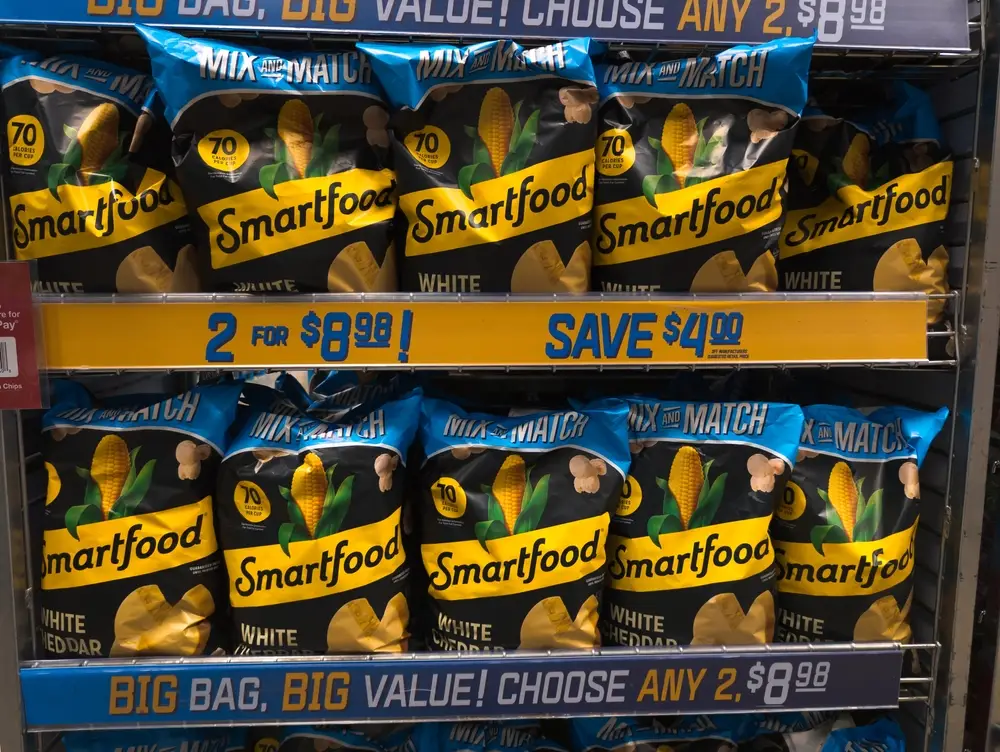Smartfood built its reputation on being a “better-for-you” snack, with bold labels promising no artificial flavors, colors, or preservatives. For many, that made White Cheddar or Movie Theater Butter popcorn an easy grab at the grocery store. But now, those same claims are at the center of a class action lawsuit accusing Smartfood and its parent company, PepsiCo, of misleading the public.
What’s the Lawsuit About?
The case was filed in New York by plaintiff Alyssa Flexer, who argues that Smartfood engaged in false advertising by presenting its popcorn as free from artificial ingredients while allegedly still including maltodextrin. She claims that she bought Smartfood White Cheddar Popcorn believing it was more natural than competing brands. When she later discovered it contained a synthetic additive, she says she felt cheated.
The complaint also alleges that PepsiCo benefits financially by charging a premium for Smartfood under the guise of being “clean” and free from artificial ingredients. The lawsuit says consumers who care about health and wellness are paying more for a product that doesn’t actually meet the standards implied by its packaging.
At its core, the lawsuit challenges what “no artificial” really means. Can a product that contains maltodextrin—a product described as highly processed powder derived from starch—truly be marketed as free from artificial preservatives?
Who’s Involved?
On one side is plaintiff Alyssa Flexer, representing everyday consumers who purchased Smartfood for themselves and their families. The other is PepsiCo, one of the largest food and beverage companies in the world.
But this isn’t the only lawsuit involving Smartfoods Popcorn. Similar lawsuits are popping up in multiple states, including Illinois and California. While each case may have different plaintiffs, the common theme is generally that Smartfood’s labeling is misleading.

What Do the Legal Claims Say?
Flexer’s lawsuit brings several claims:
- False Advertising & Consumer Protection Violations: She argues that Smartfood’s packaging and marketing mislead consumers.
- Breach of Warranty: The “no artificial” label is described as a promise that the company did not uphold.
- Unjust Enrichment: Since the popcorn was labeled as natural, PepsiCo allegedly made consumers pay more than they otherwise would have.
Judges have raised some issues, particularly regarding whether maltodextrin should be classified as a “flavor” or just a flavor enhancer. Still, the argument that it functions as a preservative has proven stronger.
This lawsuit is likely far from over. Plaintiffs may still amend their complaint and pursue damages.
Why Maltodexrin Matters
Chances are, most of us don’t think twice about maltodextrin. It’s not exactly a household word. But this fine white powder, usually made from corn, rice, or potatoes, shows up in a surprising number of packaged foods.
On paper, it looks harmless enough. But the way it’s processed is so heavy-duty that the FDA actually classifies it as a synthetic additive. In snacks like popcorn, it’s used to thicken, sweeten, or preserve shelf life.
Maltodextrin can cause quick blood sugar spikes, and some people report digestive discomfort when they eat too much of it. So when a brand like Smartfood positions itself as “free from artificial preservatives” yet still relies on maltodextrin, it raises a question many cutomers may find fair: are consumers really getting what they signed up for?
What May Happen Next
The Smartfood class action lawsuit may not sound important, but it reflects a bigger trend. More and more people seek transparency in food labeling, and lawsuits like this one are challenging the language brands can use on their packaging. Many consumers are demanding that marketing terms like “no artificial” should not come without strict accountability.
Frequently Asked Questions (FAQ)
So far, the focus is on Smartfood White Cheddar Popcorn and Movie Theater Butter Popcorn. Other flavors may be added if more consumers come forward.
If the class is certified, anyone in the U.S. who bought Smartfood Popcorn for personal or household use (but not resale) during the statute of limitations period could qualify.
Maltodextrin is a synthetic food additive made from natural ingredients. It’s typically used as a preservative, thickener, or sweetener. However, it’s been linked to digestive discomfort and blood sugar spikes.
It’s too early to know. If the lawsuit moves forward, a settlement could be announced, which may include refunds or reimbursements through the claims process.




Add Comment